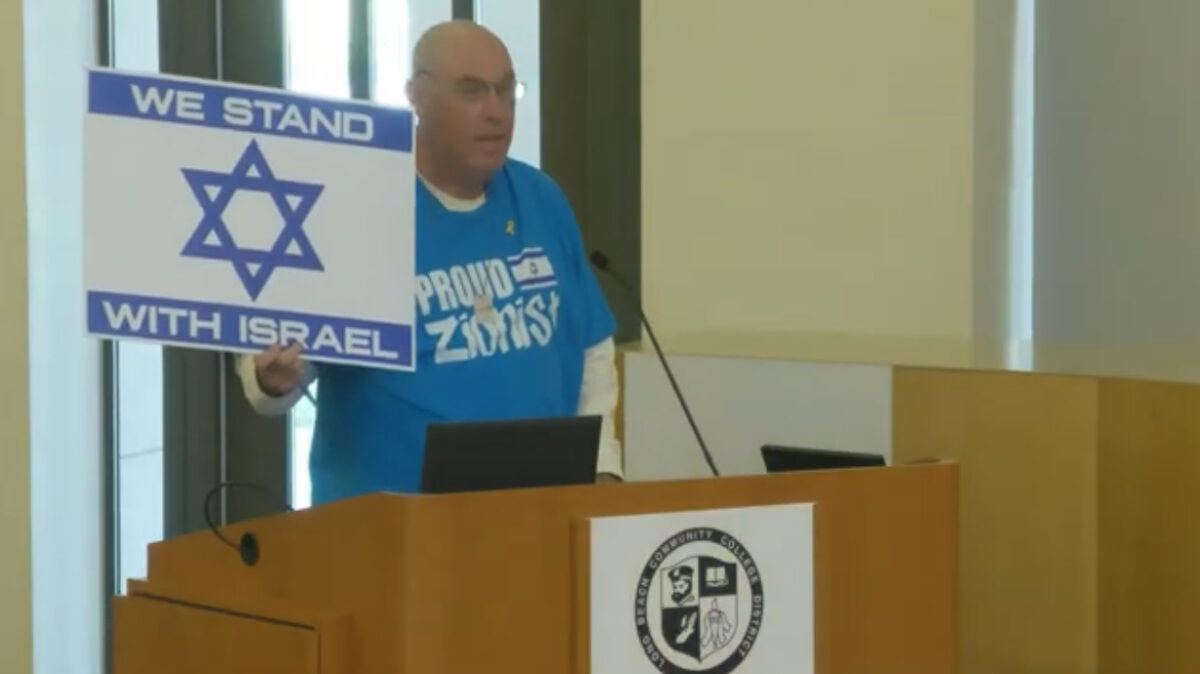A local Jewish man who has been attending Long Beach City College board of trustees meetings to make public comments in support of Israel says the college recently sent him a cease and desist letter, alleging his comments were “false and defamatory.”
Al Barlevy began attending these meetings in response to other speakers who called on the college to recognize genocide in Palestine and divest from corporations with ties to Israel, in line with the Boycott, Divestment and Sanctions movement that aims to end international support of Israel.
Barlevy says those requests are antisemitic. At the LBCC meetings, Barlevy, who identifies as a “proud Zionist,” has said Palestinian people have a culture of raping, kidnapping and murdering Jews, called pro-Palestinian speakers “Nazi-loving” and compared anti-Zionists to the Ku Klux Klan. He urged the LBCC board of trustees to call out antisemitism when they see it.
After Barlevy said at a meeting in June that the LBCC board room had become a magnet for antisemites, board president Uduak-Joe Ntuk said he rejected all accusations of antisemitism. At the next meeting in July, Barlevy commended Ntuk for rejecting antisemitism but added that such a rejection is “absolutely meaningless” because, he said, many antisemites “self-identify as anti-Zionists.” He called on Ntuk to also reject anti-Zionism.
On the evening of Aug. 6, shortly after he spoke at another meeting, Barlevy said he received an emailed letter asking him to “refrain from making any further knowingly false and defamatory statements alleging that any Board of Trustees are antisemitic.” The letter, which Barlevy shared with the Post, was signed by Vincent Ewing, the board’s legal counsel.
Though he called other speakers antisemitic, Barlevy told the Post he had never called Board of Trustees members antisemitic. “In fact, I thought it’s the exact opposite because they’ve never consented to any of the demands made by the pro-Palestinian speakers.”
A spokesperson for LBCC declined to discuss the letter. She said the district routinely communicates with community members on issues of decorum, adding that the college has a policy against commenting on individual correspondence or legal communications.
Pursuing a defamation case against Barlevy would be difficult, according to David Loy, legal director for the First Amendment Coalition.
Under California law, statements made at a legislative proceeding, such as a college board of trustees meeting, are generally shielded from such claims, he said, and there are broad protections for speech made in these settings.
“Just because somebody thinks you’re being mean or rude or unfair does not make it defamation in the eyes of the law,” Loy said.
The letter stated it was not intended to interfere with Barlevy’s freedom of speech or rights under federal or state law. It also stated the board would consider legal action if any future communications from Barlevy included violent threats, defamatory statements “made with actual malice” or harassment.
“That’s kind of talking out of both sides of their mouth,” Loy said. Saying cease and desist and threatening potential legal action “has a chilling effect on speech, whatever other disclaimers you try to bracket it with,” he said.
Barlevy has continued attending and speaking in support of Israel at LBCC board meetings since receiving the letter.

